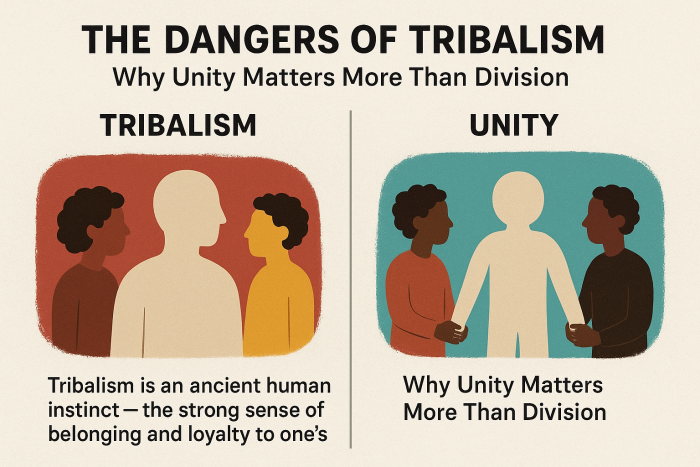The Dangers of Tribalism — Why Unity Matters More Than Division.
Introduction

Tribalism is an ancient human instinct — the strong sense of belonging and loyalty to one’s own group. It can be based on colour, ethnicity, language, religion, or even social class. While belonging to a community gives people identity and comfort, excessive attachment to one’s tribe often turns into pride, discrimination, and division. When people start to see others as “less than” because they are different, society begins to crumble from within.
Understanding the Many Faces of Tribalism
1. Colour Tribalism
Colour tribalism appears when people judge others by their skin tone. Instead of celebrating diversity, they attach worth or superiority to a particular colour. This kind of mindset creates invisible walls between humans who were meant to coexist peacefully. History has shown how dangerous this can be — from racial discrimination to global injustice.
2. Language Tribalism
Language should be a bridge, not a barrier. Yet, many times, people mock or look down on others for speaking differently or having a particular accent. Every language carries beauty, heritage, and identity. To despise someone because of the way they speak is to despise a part of humanity itself.
3. Ethnic and Regional Tribalism
Ethnic pride can help preserve traditions, food, and culture — but when it becomes an excuse to hate, exclude, or belittle others, it becomes toxic. In many societies, ethnic tribalism causes favoritism, corruption, and conflict. Instead of uniting to solve shared problems, people fight to protect their small circle of belonging.
The Consequences of Tribalism
Tribalism divides families, communities, and nations. It breeds mistrust and destroys the spirit of cooperation. It limits opportunities because people choose based on “who you know” rather than “what you can do.” Over time, it weakens progress and replaces merit with bias. A nation that judges its citizens by tribe or colour can never achieve true peace or development.
A Higher Moral Vision
Across all moral and spiritual teachings, the message is the same: we are all human before anything else.
Every person is born equal in dignity and potential. What truly separates people is not race or tongue, but values — honesty, compassion, humility, and righteousness.
From the Islamic perspective, tribalism is a disease of ignorance. The Qur’an teaches that humanity was created into nations and tribes not to despise one another, but to recognize and appreciate diversity. The only thing that elevates one person above another is goodness of character and piety. Prophet Muhammad (peace be upon him) reminded the world that no race or tribe is superior to another, except by their deeds and moral standing.
How to Overcome Tribalism
1. Educate the heart and mind — Learn about other cultures and understand the beauty of diversity.
2. Build fairness in daily life — Treat everyone equally, regardless of origin.
3. Promote collaboration — Work with people outside your comfort zone.
4. Encourage inter-tribal friendships and marriages — These build bridges that outlast boundaries.
5. Judge by character, not by category — Honour people for their integrity, not their identity.
Conclusion
Tribalism may begin as loyalty, but it ends as division when left unchecked. The world becomes stronger when we see humanity before tribe, character before colour, and kindness before pride. The future belongs to those who unite people, not those who divide them. Let us rise above prejudice and build a world where every heart is valued, and every difference is respected — for in diversity lies our greatest strength.
Post Comment